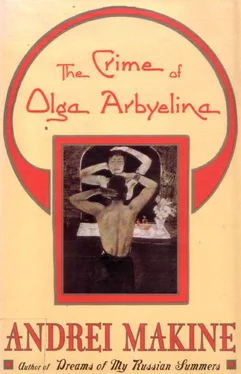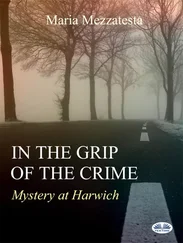The head swathed in a large white square with two horns reappeared at the end of the improvised operating table. "I'm not hurting you too much, am I?" And it dived in again between the patient's parted knees.
This silent smile too, must be added to the inventory. In resuming it she must strive for the greatest possible precision in the details. A cramped room, an incredible accumulation of furniture: that cupboard made of dark wood, almost black; a writing desk; a piano with candelabra fixed to it at each end of the keyboard; two armchairs close together like in a cinema auditorium; a pedestal table; sets of shelves-everything piled high with books, statuettes, knickknacks, vases with bunches of dried stems. On the walls a patchwork of pictures: antique portraits with barely visible features and bright, airy landscapes cheek by jowl with abstract geometry. In the corner, almost up against the ceiling, the brown, gilded rectangle of an icon, concealed beneath a long draped fabric… And in the middle of this chaos, straight, clean sheets, the smell of alcohol, a table that looks like an ice floe. Outside the window, some rhythmic chanting, those fleeting echoes that people carry away with them mechanically after a demonstration or a carnival. A snatch of music is woven into it- the joyful sob of an accordion, the sound of which conjures up a vision of the avenue in its August heat…
The nature of the pain altered, becoming harsher, more humiliating in its physiological banality. Olga sensed that the words were already trembling in her mind and that, in an indignant, silent protest they were about to blame her own stupidity ("What an idiot! At my age!"); as well as the vigilant, petty perfidiousness of life ("The moment was well chosen, enough said! Or rather I was the one well chosen, otherwise I might have been able to cling to a few illusions about the best of all possible worlds…"). She hurriedly resumed her game of stocktaking. Yes, the festive shouts outside the window: the second anniversary of the Liberation of Paris… In the morning, on her way to her friend's house, she had noticed the profusion of flags on the fronts of buildings… Yes, this city at once animated and drowsy; this one-story house at the edge of the fifteenth arrondissement; this sun beating against the closed shutters on the ground floor. And, in a room isolated from the world, two women. One of them stretched out on a table, covered by a sheet, the other bent over the first's lower abdomen, her head swollen by an enormous white headdress with horns, engaged in performing a clandestine abortion.
Olga felt her indignation thwarted by the absurdity of the situation. She could have been indignant if the pain had violated some logic, flown in the face of justice. But there was no logic to it. Just scattered fragments; unpleasant pricks that raised goose bumps on her thighs on that stifling afternoon of August 25, 1946; the room crammed with furniture; a woman subjecting another woman to an operation held to be criminal. "A clandestine abortion," Olga repeated mentally, thinking that the improbability of her situation might well have been even more striking. One had only to picture how close her half naked body was to the passersby outside the shutters. Her body that had been surgically amputated from the tiny life enclosed within it, a body now singular but which, from tomorrow onward, would melt back into the crowd of other bodies, indistinguishable from their mass.
She heard another click of metal on the tray. Her friend's horned head bobbed up at the end of the table.
"That's it?!" They spoke with one voice, one asking, one stating, in unintended unison, as often happens with people who have known one another for a very long time and end up unconsciously following the course of one another's thoughts…
"And yet," thought Olga, "we'll never breathe a word about the most important things. I'll never even tell her how I make lists to help me forget the pain. The second anniversary of the Liberation; this tiny death in my womb; the portrait on the wall looking at me. How could I explain? I'd have to be able to ask her if she has thoughts of this kind; if trivia like this fill her mind, too, and seem important to her…" Those accordion notes just now; they brought on that sudden longing for an easy happiness, spine-tingling, very French, or at least what people imagine as French. The fleeting but burning desire to be without past, without thoughts, without weight; to be merry, intoxicated with being alive here and now. And all at once the shame at having had this longing. The vigilant censorship that watches over our happiness, a pitiless voice, always on the alert. A voice that reproaches her with the little life destroyed in her womb-as an immediate punishment for this longing to be happy. So many fragments of joy and fear we are made up of and never speak of.
But there had been no mention of any of this in their conversation at noon before the operation. They recalled the Parisian midwife who had been guillotined some years previously, for having practiced clandestine abortions. They chattered jokingly, making faces and feigning theatrical terror: "The French will guillotine us!" The anecdote allowed them to remain silent about what was on the tips of their tongues, in their eyes, their real lives, made up of little nothings that were serious, essential, inadmissible.
"I'm putting away my instruments of torture. You can get up. I've put your dressing gown here on the armchair."
Her friend touched her shoulder, smiling, then went out, taking with her the tray covered in a crumpled napkin. "That smile, I've already added it to my painkilling inventory" August 25, 1946. A room transformed into a used furniture store filled with Russian curios. The smiling face of a woman-a scarred face that since adolescence had borne a deep gash cut into her left cheek, like a pink butterfly with torn wings. Her smile made the butterfly move; the most childlike, the most vulnerable smile in the world, one from which strangers turned away, so as not to let their revulsion be seen… The face of Li. Li, lily… At a party in the days of their childhood in Russia long ago a ten-year-old child weeps: the others are in fancy dress as flowers; her own costume, a lily-dress, has gone astray. People hear her lamenting: "Li-li-lia!" They laugh. They make up a nickname. The child becomes Li. She is consoled with a replacement costume-that of a magician: she has a turban with a peacock's feather, a star-spangled cape, a magic wand. She falls in love with the role. At every party from now on it is she who takes charge of the magic; she learns conjuring, knows how to set off fireworks. People have almost forgotten her real name, Alexandra… One festive evening a many-colored rocket hits her in the face before falling into the grass and exploding in a shower of stars that makes the children shout with glee. Her own cry is lost amid the tumult of laughter and applause. She is fifteen…
In her inventory just now Olga included that child. A child disfigured because someone had once found her a magician's costume. A child who would survive wars, famines, indifference, and disgust in the eyes of others and end up in a stifling room, lost in the midst of the Parisian ant-heap, on August 25, 1946, causing pain, while she tended it, to the bared body of a woman.
Along with the cool from the windows, opened at last, the evening also brought the marvelous sensation of the pain fading. Lying on a sofa squeezed between the piano and the armchairs, Olga heard her friend busying herself in the kitchen. The clatter of crockery, the swish of the water. Li… pleasantly distracted, as a woman can feel in the evening, soothed by the routine sequence of tasks. Li… so close, a friend for so long and at the same time unknowable. Other people are made up of questions that one dare not put to them…
Читать дальше












